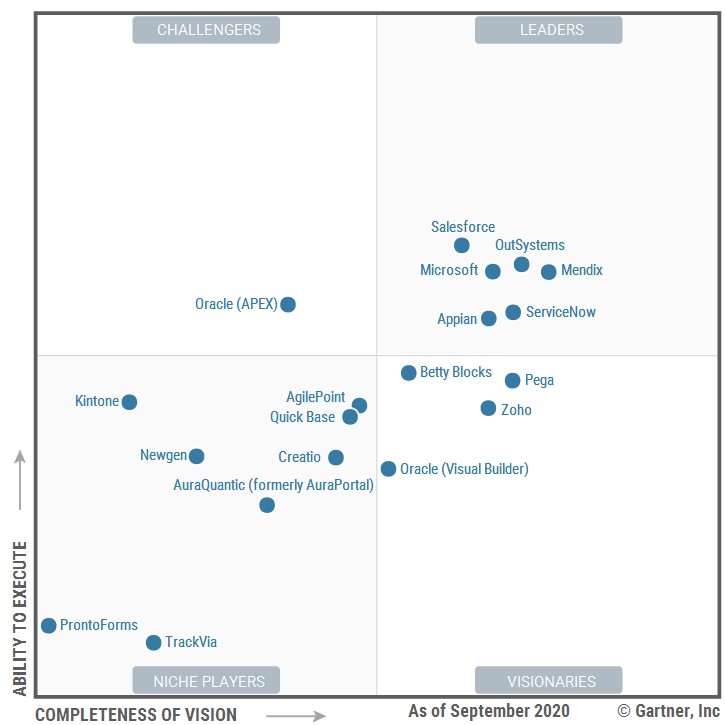Today, we are announcing that Microsoft has been named a Leader for the second year in a row in the Gartner Low Code Application Platform (LCAP) Magic Quadrant. In the report, you’ll learn about Gartner’s assessment of the products in this market and explore their features.
Disclaimer: This graphic was published by Gartner, Inc. as part of a larger research document and should be evaluated in the context of the entire document. The Gartner document is available upon request here. Gartner does not endorse any vendor, product or service depicted in its research publications and does not advise technology users to select only those vendors with the highest ratings or other designation. Gartner research publications consist of the opinions of Gartner’s research organization and should not be construed as statements of fact. Gartner disclaims all warranties, expressed or implied, with respect to this research, including any warranties of merchantability or fitness for a particular purpose.
Digital transformation and continued growth from customer feedback
We would like to thank you, our customers and community members, for your passion and enthusiasm that has directly translated into our product vision and capabilities. Every day, hundreds of thousands of organizations, like Ikea Sweden, Toyota North America, T-Mobile, Telstra, and the City of Kobe, are building apps and experiences that help them with their digital transformation.
Based on your feedback, we will continue to deliver value across the following themes:
Bridging the digital and physical world: Whether you’re plotting business data on interactive maps or visualizing 3D models and holograms, customers can now realize immediate value by unlocking geospatial data through low-code.
AI everywhere: Data-driven process mining to identify automation opportunities along with virtual entities that allow remote data to be fully processed through CDS means customers can more easily take advantage of AI-assisted automation along with building unique new no-code experiences in AI Builder.
Enhancing the value of Microsoft Power Platform in Microsoft Teams: With Project Oakdale, customers can now build over a low-code data platform, supporting relational, file, and image data, for any Teams user while Microsoft Azure API Management integration with Teams means customers may now distribute Microsoft Power Apps experiences massive scale and with no additional license needs beyond Teams.
Fusion development teams and pro developer focus: Unified maker, administration, and governance capabilities across Power Apps, and Microsoft Power Automate for low-code and code-first developers, along with new capabilities for Power Apps build tools to enable comprehensive lifecycle management by incorporating GitHub actions and CI/CD means customers can advance their Centers of Excellence with end-to-end reporting and deeper governance controls for low-code and code-first development fusion teams.
Hyper automation: Enabling hyper automation through RPA for more resilient UI and democratizing RPA across Microsoft’s ecosystem with new UI automation scenarios for Power Platform, Microsoft Dynamics 365, Microsoft 365, and Microsoft Azure means customers can quickly take advantage of out-of-the-box RPA automations or use RPA APIs across common external service and database frameworks.
We believe that a comprehensive low-code platform is critical to help customers meet their business needs. This, in conjunction with our robust seeded offerings in Office 365 and Teams, makes it easier for organizations to expedite their digital transformation journey. We look forward to continuing to partner with customers on this journey together.
Source: Paper.li



Comments